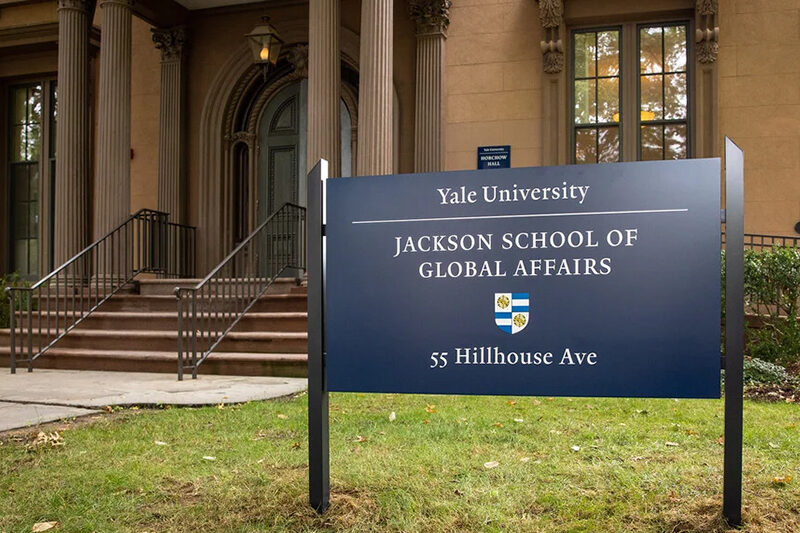The new center will support interdisciplinary work focused on advancing national defense, diplomacy, intelligence, and international economic relations.
The Yale Jackson School of Global Affairs has announced the launch of the Blue Center for Global Strategic Assessment, which will support interdisciplinary teaching and research focused on generating actionable knowledge that contributes to the strategic exercise of statecraft.
The Blue Center will approach teaching and research in global affairs by organizing around problems (and their solutions) and integrating academic scholars and leading policy practitioners, an innovative approach adopted by the Jackson School. This interdisciplinary approach will support research that is sharply focused and actionable, said Jim Levinsohn, the dean of the Jackson School.
The center’s research will address interrelated issues in the areas of national defense, diplomacy, intelligence, and international economic relations.
The Blue Center will bring together scholars from around the world who are experts in the fields of history, economics, data science, political science, and law, as well as leading figures from the military, intelligence, and diplomatic communities.
From its inception, the Blue Center will be nimble and flexible, according to Jackson School leadership. It will support fixed term, renewable research initiatives consistent with the center’s scholarly focus.
The center is made possible by a generous gift from Neal Blue, a graduate of the Yale College Class of 1957. In addition to funding research and teaching initiatives, the gift will also fund professorships, Senior Fellows, and student fellowships.
“We are incredibly grateful to Neal for his exceptional generosity,” said Levinsohn. “This center will help Jackson build on its momentum as Yale’s first new school in almost 50 years, and it will truly establish Jackson as one of the foremost programs in the country for the study of security and statecraft. This goes right to the core of our mission to prepare students for global leadership and service.”
The Blue Center will be overseen by a board of faculty directors, drawn from the Jackson School’s professors of global affairs, and holding a diverse set of joint appointments: Lorenzo Caliendo, the Won Park Hahn Professor of Global Affairs and Management and a professor of economics in Yale’s Faculty of Arts and Sciences (FAS); David Engerman, the Leitner International Interdisciplinary Professor of History and Global Affairs at the Jackson School and FAS; and Jennifer Gandhi, a professor of political science and global affairs at FAS and the Jackson School.
Phil Kaplan, ’12, ’20 J.D., will serve as the center’s inaugural executive director. Prior to joining Jackson, Kaplan served in the U.S. Department of the Treasury as the senior advisor for terrorist financing and financial crimes.
“We are at a critical moment of evolution for the way states are leveraging interdependencies, new technologies, and especially data, to interact and compete with one another,” said Kaplan. “The Blue Center will provide a home at Yale for students and faculty who care about these issues.”
The center will take a broad view of the elements of national power. Casey King, a senior lecturer at Jackson whose research focuses on artificial intelligence and the use of mega-data to inform policy, described the center as an important addition to the Jackson School.
“Data analysis for policymaking is on the brink of a revolutionary transformation driven by AI. This new center will be at the heart of this evolution,” he said. “It’s exhilarating to know that we’ll have an intellectual hub where students and scholars can collaborate and innovate at the cutting edge of these changes.
Gandhi commended the Jackson School’s commitment to an interdisciplinary approach to the study of global affairs. “The Jackson School is genuinely interdisciplinary,” she said. “It’s great to see the new Blue Center embraces that approach to problem solving.”
Both undergraduate and graduate students will be eligible to take courses supported by the center; to attend lectures from practitioners and academics invited to campus by the center throughout the school year; and to submit research initiatives to the center for funding. A call for such initiatives will be made after the center has officially launched during the fall semester.
